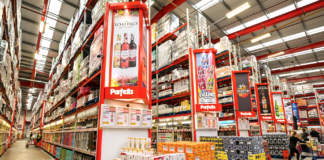Sony Bihal has a five-year plan for becoming the top wholesaler in his area, writes TAN PARSONS
Sony Bihal, managing director of Time Cash & Carry, has a map that will play a crucial role in his business strategy this year. It is centred on Barking in Essex, where the depot and company HQ is based, and traces a rough line that circles the warehouse, takes in the surrounding area, moves through parts of east London, dips just south of the Thames, and then comes back up and into Essex.
It is a map of everywhere within half an hour’s drive of the depot. This is the cut-off point for whether retailers will bother to drive in, he says, and it shows there is room for improvement.
“We are doing £35m a year, but there is £35m a week within this area,” says Bihal. His calculation is based on the number of independent businesses inside the line on the map multiplied by how much they are turning over and he is determined to grab a bigger slice of the pie.
To put this ambition in context, Time has achieved double-digit growth in the last year, reaching a turnover of more than £35m with a relatively modest depot of 33,000sq ft. Despite this rapid growth, Bihal wants to increase Time’s share of the market much further. He will do it by offering brilliant prices and profit-on-return (PoR) margins to help independents compete with the multiples.
[quote_box_right]
Sony’s Top sales tips
- MAP IT OUT: Take a look at the location where your business is based and the potential revenue in the surrounding area. Are you getting a big enough share?
- BENCHMARK: There are seven things most wholesalers need to be good at: alcohol, tobacco, core groceries, delivered, own-brand, online and credit policy. Where can you improve?
- HIGHLIGHT MARGIN: Profit is important to customers, so display it on every product you stock. The magic number for retailers is 22%
[/quote_box_right]
“We are strong on price – we have a good relationship with suppliers,” he says.
“We are cheaper than Booker and Bestway. However, you can be the cheapest, but if you are out of stock, you look like a fool.”
The group is excellent at maintaining its database of customers and its stock, but a lack of space is holding it back. Time’s five-year plan is to have three depots, with the second one opening as soon as 2014.
Benchmarking
To measure how his business can improve, Bihal benchmarks it against competitors in seven areas: alcohol, tobacco, core groceries, delivered, own-brand, online and credit policy.
“Booker and Bestway tick all the boxes – they are great businesses,” he says.
There are three areas in which Time needs to catch up: its core grocery range, delivered and online. Work is already underway – Bihal estimates that with the extra depots, core groceries could boost turnover by up to £700,000 a month, Time has already started doing multi-drops and delivering to local people; the group’s website ordering goes live this year and it also has a smartphone app coming out.
Time also offers marketing services to customers. For an annual fee of £25, it will set up independent businesses with a basic front page on a social networking site. The company follows the principle that these sites are only useful if used properly, so tries to ensure that each page gives consumers a regular dose of promotions, knowledge and fun.
Bihal says: “The big opportunity is around online, social media and apps. There’s a huge opportunity coming up and I don’t think people properly understand how powerful it is yet.
“If we can influence behaviour, there’s a gain for us. Look how much business Booker and Bestway have coming in from online now. But you have to invest smart.”
This isn’t the only area where Bihal is investing. The company has already opened a handful of pubs and restaurants, and has plans to open its own shop fascia under the banner Time Express, which will be similar to Landmark’s Lifestyle Express.







